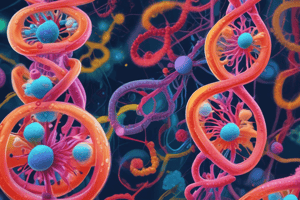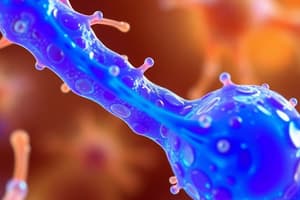Podcast
Questions and Answers
What is the primary function of the xylem in plant physiology?
What is the primary function of the xylem in plant physiology?
- Storing energy
- Transporting water (correct)
- Photosynthesis
- Transporting nutrients
Which process occurs during meiosis but not during mitosis?
Which process occurs during meiosis but not during mitosis?
- Cytokinesis
- Chromosome replication
- Cell division
- Independent assortment of chromosomes (correct)
Which type of biological molecule serves as a primary energy source for cells?
Which type of biological molecule serves as a primary energy source for cells?
- Carbohydrates (correct)
- Proteins
- Lipids
- Nucleic acids
What is the purpose of feedback mechanisms in homeostasis?
What is the purpose of feedback mechanisms in homeostasis?
Which method is commonly used in genetic engineering to modify genes?
Which method is commonly used in genetic engineering to modify genes?
In the context of ecosystems, what is 'biodiversity'?
In the context of ecosystems, what is 'biodiversity'?
What is the role of enzymes in biological systems?
What is the role of enzymes in biological systems?
Which of the following best describes natural selection?
Which of the following best describes natural selection?
Flashcards are hidden until you start studying
Study Notes
A Level Biology AQA Overview
Key Areas of Study
-
Cell Biology
- Structure and function of prokaryotic and eukaryotic cells
- Cell membranes and transport mechanisms (diffusion, osmosis, active transport)
- Cell division (mitosis and meiosis)
-
Biological Molecules
- Structure and function of carbohydrates, proteins, lipids, and nucleic acids
- Enzyme structure, function, and kinetics
- Metabolism and energy transfer in biological systems
-
Genetics
- Principles of inheritance (Mendelian genetics)
- DNA structure, replication, and protein synthesis
- Genetic variation, mutations, and gene technology
-
Evolution and Ecology
- Natural selection and adaptation
- Ecosystems, energy flow, and nutrient cycles
- Population dynamics and biodiversity
-
Physiology
- Human organ systems (circulatory, respiratory, digestive, nervous, and excretory)
- Homeostasis and feedback mechanisms
- Plant physiology and transport systems (xylem and phloem)
-
Biological Techniques
- Laboratory techniques (microscopy, chromatography, electrophoresis)
- Data analysis and statistical methods in biology
- Practical skills and experimental design
Assessment Structure
- Written Examinations: Three papers covering various topics
- Paper 1: Biological processes (topics from cell biology, biological molecules, and genetics)
- Paper 2: Biological diversity (evolution, ecology, and physiology)
- Paper 3: Unified biology (practical skills and data analysis)
Practical Skills
- Emphasis on practical laboratory work
- Development of skills such as:
- Planning experiments
- Data collection and interpretation
- Use of scientific equipment
Important Concepts
- Homeostasis: Maintenance of stable internal conditions.
- Photosynthesis: Process by which plants convert light energy into chemical energy.
- Respiration: Aerobic and anaerobic processes for ATP production.
- Genetic Engineering: Techniques such as CRISPR for gene modification.
Study Tips
- Focus on understanding concepts rather than rote memorization.
- Practice past paper questions and practical scenarios.
- Create mind maps to visualize connections between topics.
- Participate in study groups for collaborative learning.
Cell Biology
- Prokaryotic cells lack a nucleus and membrane bound organelles
- Eukaryotic cells have a nucleus and other membrane bound organelles
- Cell membrane controls the movement of substances in and out of the cell
- Diffusion is the movement of molecules from a high concentration to a low concentration
- Osmosis is the movement of water molecules across a selectively permeable membrane
- Active transport requires energy to move molecules against their concentration gradient
- Mitosis is cell division for growth and repair which results in two daughter cells with the same number of chromosomes as the parent cell
- Meiosis is cell division for sexual reproduction which results in four daughter cells with half the number of chromosomes as the parent cell
Biological Molecules
- Carbohydrates are made up of carbon, hydrogen and oxygen and include sugars, starches and cellulose.
- Proteins are made up of amino acids and have a wide variety of functions including enzymes, hormones and structural components.
- Lipids a group of molecules that includes fats, oils, waxes and steroids, are largely hydrophobic and are important for energy storage and insulation
- Nucleic acids are composed of nucleotides, which are made up of a sugar, a phosphate group and a nitrogenous base.
- Enzymes are biological catalysts that speed up the rate of chemical reactions.
- The active site of an enzyme is where substrate molecules bind.
- Enzymes are specific in their action and can be affected by temperature, pH and inhibitors.
- Metabolism is the sum of all chemical reactions that occur within an organism.
- Energy transfer in biological systems is essential for life and involves processes such as photosynthesis and respiration.
Genetics
- The principles of inheritance were discovered by Gregor Mendel.
- Genes are located on chromosomes and carry information about inherited traits.
- DNA is the genetic material that codes for proteins.
- DNA replication is the process by which DNA copies itself.
- Protein synthesis involves transcription and translation.
- Mutations are changes in the DNA sequence that can lead to genetic variation.
- Gene technology involves techniques for manipulating genes, such as gene cloning and gene therapy.
Evolution and Ecology
- Natural selection is the process by which organisms with advantageous traits are more likely to survive and reproduce.
- Adaptation is a trait that increases an organism's fitness in a particular environment.
- Ecosystems are communities of living organisms and their physical environment.
- Energy flow in an ecosystem involves the transfer of energy from one trophic level to the next.
- Nutrient cycles involve the movement of essential elements through an ecosystem.
- Population dynamics is the study of how populations change over time.
- Biodiversity is the variety of life on Earth, including species diversity and genetic diversity.
Physiology
- The circulatory system transports blood throughout the body.
- The respiratory system is responsible for gas exchange.
- The digestive system breaks down food and absorbs nutrients.
- The nervous system transmits signals throughout the body.
- The excretory system removes waste products from the body.
- Homeostasis is the maintenance of a stable internal environment.
- Feedback mechanisms are used to regulate homeostasis.
- Plant physiology includes processes such as photosynthesis, transpiration and mineral uptake.
- Xylem is a vascular tissue that transports water and dissolved minerals from the roots to the leaves.
- Phloem is a vascular tissue that transports sugars from leaves to other parts of the plant.
Biological Techniques
- Microscopy is used to view small structures.
- Chromatography is used to separate mixtures of molecules.
- Electrophoresis is used to separate molecules based on size and charge.
- Data analysis involves summarizing and interpreting data.
- Statistical methods are used to draw conclusions from data.
- Practical skills include experimental design, data collection and interpretation.
- The ability to generate data, analyse and evaluate is essential for a successful Biology career.
Studying That Suits You
Use AI to generate personalized quizzes and flashcards to suit your learning preferences.




